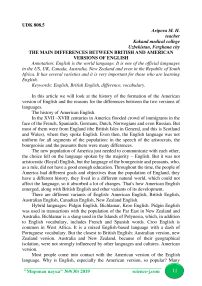The main differences between British and American versions of English
Автор: Aripova M.H.
Журнал: Мировая наука @science-j
Рубрика: Основной раздел
Статья в выпуске: 9 (30), 2019 года.
Бесплатный доступ
English is the world language. It is one of the official languages in the US, UK, Canada, Australia, New Zealand and even in the Republic of South Africa. It has several varieties and it is very important for those who are learning English.
English, british english, difference, vocabulary
Короткий адрес: https://sciup.org/140264874
IDR: 140264874 | УДК: 808.5
Текст научной статьи The main differences between British and American versions of English
In this article we will look at the history of the formation of the American version of English and the reasons for the differences between the two versions of languages.
The history of American English.
In the XVII –XVIII centuries in America flooded crowd of immigrants in the face of the French, Spaniards, Germans, Dutch, Norwegians and even Russian. But most of them were from England (the British Isles in General, and this is Scotland and Wales), where they spoke English. Even then, the English language was not uniform for all segments of the population: in the speech of the aristocrats, the bourgeoisie and the peasants there were many differences.
The new population of America just needed to communicate with each other, the choice fell on the language spoken by the majority – English. But it was not aristocratic (Royal) English, but the language of the bourgeoisie and peasants, who, as a rule, did not have a good enough education. Throughout the time, the people of America had different goals and objectives than the population of England, they have a different history, they lived in a different natural world, which could not affect the language, so it absorbed a lot of changes. That's how American English emerged, along with British English and other variants of its development.
There are different variants of English: American English, British English, Australian English, Canadian English, New Zealand English.
Hybrid languages: Pidgin English, Bichlamar, Kroo English. Pidgin English was used in transactions with the population of the Far East in New Zealand and Australia. Bichlamar is a slang used in the Islands of Polynesia, which, in addition to English vocabulary, includes French and Spanish words. Croo English is common in West Africa. It is a mixed English-based language with a dash of Portuguese vocabulary. But the closest to British English: Australian version, new Zealand version. Australia and New Zealand, because of their geographical isolation, were not strongly influenced by other languages and cultures. American version.
Most people come into contact with the American version of the English language. Why is English, especially the American version, so popular? Many

people learn it because Americans speak it, and America is one of the biggest countries in the world. The US is a leader in science and technology. The Americans themselves say that the world must understand America. The differences between American and British versions of English are quite noticeable. But in fact, they are not so much. It is sometimes difficult to know whether a book was written by an American or a British author. Since the American version is the most widely used in the modern world, linguists have already made attempts to systematize the lexical, spelling, phonetic and grammatical differences between the American version of English from the British.
Differences between British and American English of Course, there are more similarities than differences between these variants – they are the same language! But still there are a number of differences between them, the main one is the simplicity of the American version. Replenishment of the vocabulary of the English language in America went in two ways:
-
1. through the formation of new words and stable phrases and reinterpretation of old ones;
-
2. by borrowing from other languages. Sometimes the reason for the development of a word of a new meaning is the similarity of the objects designated by this word. This phenomenon is found, for example, in the English word “store”, which in America has acquired the meaning of store, shop. This reinterpretation was caused by the fact that at that time in the colonies, any store by necessity was also a warehouse of goods. Hence the phrase keep the store to have a store. A special group consists of words, the meaning of which has undergone a complete rethinking. This process can be traced, for example, in the English noun corn, which in England means any crops.
In America, the word corn came to mean corn, that is, corn. it is the culture that had to be cultivated mainly by the first settlers. One of the sources of vocabulary in this period were borrowings from other languages and, first of all, from the languages of the Indian tribes that inhabited North America. English is the world language. It is one of the official languages in the US, UK, Canada, Australia, New Zealand and even in the Republic of South Africa. As they say all over the world, It has several varieties. This is very important for those who are learning English.
Thus, the differences between American and British English are quite noticeable.
Appendix 1. Main differences in spelling
|
British English |
American English |
|
-ll- |
-l- |
|
travelled |
traveled |
|
cancelling |
canceling |
|
dialled |
dialed |
|
-me, -ue |
- |
|
programme |
program |
|
catalogue |
catalog |
|
monologue |
monolog |
|
dialogue |
dialog |
|
-s- |
-z- |
|
Organization |
organization |
|
analyse |
analyze |
Appendix 2. Main differences in vocabulary
|
British English |
American English |
|
Flat lawyer luggage milliard taxi company city/town centre chemist’s lift autumn |
apartment attorney baggage billion cab corporation downtown drugstore elevator fall |
Список литературы The main differences between British and American versions of English
- Arakin V. D. History of the English language. - M., 2001-P.19
- Komova T. A., Garagulya S. I. personal Name in the history and culture of great Britain and the USA. - Belgorod, 1998-P. 52
- Crystal D. English as a global language. - M., 2001-P. 6


